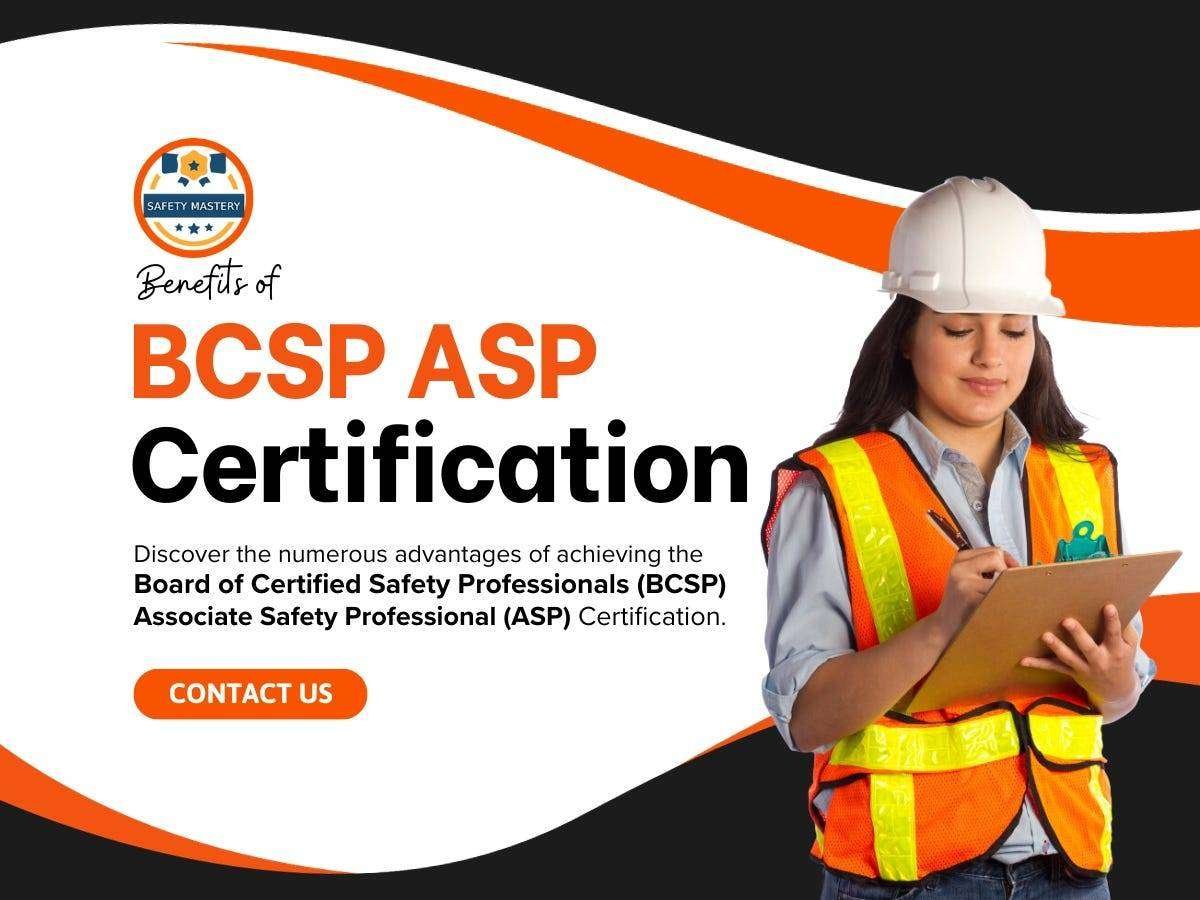You’ve been working in the safety field for a few years now and you’re ready to take your career to the next level. One of the best ways to do that is by becoming an Associate Safety Professional or ASP. This certification proves you have the knowledge and skills to perform essential safety and health functions. It opens up more career opportunities and the potential for higher pay.
Getting your ASP may seem like a daunting process, but don’t worry, we’ve got you covered. This guide will walk you through everything you need to know to obtain your ASP certification. We’ll look at the requirements, exam content, study resources, and tips for passing the exam. By the end of this, you’ll feel confident in registering for and completing the ASP exam. You put in the work every day to make workplaces safer, so you owe it to yourself to get credentialed. Let’s get started!
What Is the Associate Safety Professional (ASP) Certification?
The Associate Safety Professional (ASP) certification is an entry-level credential for those in occupational safety and health. To become an ASP, you need a bachelor’s degree, two years of related experience, and to pass an exam.
ASP Certification Education and Experience Requirements
To qualify for the ASP exam, you must have a bachelor’s degree or higher in any field of study. You also need at least two years of related occupational safety and health experience. This can include internships, entry-level jobs, or related military experience.
The ASP Exam
The ASP exam covers a wide range of OSH topics like standards and regulations, hazard control, risk management, and safety education and training. The computer-based exam has 200 multiple-choice questions. You have four hours to complete it. To pass, you need a scaled score of at least 600 points.
Maintaining Your ASP Certification

To keep your ASP current, you must pay an annual renewal fee and earn a minimum of 10 hours of continuing education units each year. You will need to renew your certification every three years. At renewal time, you may need to provide documentation of your continuing education.
Earning the ASP certification can help launch your career as an occupational safety and health professional. It shows your employers that you have a solid foundation of knowledge and skills to keep people safe and healthy on the job. If you’re looking to advance in the field, the ASP is a great place to start.
Benefits of Earning Your ASP Certification
Earning your Associate Safety Professional (ASP) certification comes with many benefits.
Career Advancement
With an ASP certification, you’ll open up more career opportunities and the potential for higher pay. Employers recognize the ASP as a mark of competence and professionalism in the safety field. Having this credential can help fast-track your career and make you a strong candidate for leadership roles.
Improved Knowledge and Skills
To become ASP certified, you need to meet educational and experience requirements, as well as pass an exam. Preparing for the exam forces you to strengthen your knowledge and skills in areas like risk management, ergonomics, fire prevention, environmental management, training, and accident investigation. This helps ensure you provide the best safety practices and guidance.
Greater Credibility
As an ASP, you’ll gain recognition and respect as a safety expert. Your certification shows you have a proven track record of meeting high standards of education, experience, competence, and ethical practice. This gives you more credibility and authority to influence safety policies, procedures, and behaviors in your organization.
Higher Salary Potential
On average, ASP-certified professionals earn over $10,000 more per year than their non-certified counterparts. While salary depends on factors like location, experience, education, and job type, becoming an ASP can put you on the path to increased compensation as you advance in your career.
With knowledge, skills, credibility, career growth, and earning potential, ASP certification is well worth the investment. If you’re serious about workplace safety, becoming an Associate Safety Professional is one of the smartest moves you can make.
Eligibility Requirements for the ASP Exam

To qualify for the ASP certification exam, you must meet certain eligibility requirements. The Board of Certified Safety Professionals (BCSP) outlines the criteria to ensure candidates have the necessary education, work experience, and training to become an ASP.
To be eligible, you must have a bachelor’s degree or higher in any field of study from an accredited college or university. The degree can be in safety, health, environment or a related field. If your degree is not in a safety-related major, you will need at least one year of safety-related work experience.
In addition to education, you must have at least four years of experience in a professional safety position. This includes health and safety specialist roles like risk management and loss control positions. Professional safety positions involve at least 50% of your job duties dedicated to safety-related tasks. Examples include:
- Conducting safety inspections and audits
- Developing and implementing safety programs
- Investigating incidents and accidents
- Training employees on safety procedures and topics
- Maintaining compliance with OSHA and EPA regulations
You must also complete a minimum of 30 hours of safety-related education or training. This includes attending professional development courses, seminars, or training events. Acceptable topics include accident investigation, ergonomics, industrial hygiene, and construction safety. Professional safety certifications like the OSHA 30-hour training will also count toward the requirement.
In summary, to qualify for the ASP exam, you need a relevant degree, four years of professional safety work experience, and 30 hours of safety education or training. Meeting these eligibility requirements will allow you to register and schedule your ASP certification exam. With adequate preparation, you will be on your way to becoming an Associate Safety Professional.
How to Prepare for the ASP Exam

To prepare for the ASP exam, there are a few key steps you should take.
Review the Exam Blueprint
The exam blueprint outlines the content areas and topics that will be covered on the exam. Make sure you understand the percentages of questions from each domain. Focus your study time appropriately.
Study the ASP Exam Review Manual
The review manual covers all the information you need to know for the exam. Read through the entire manual, highlighting key terms and concepts. Pay extra attention to areas you’re less familiar with. Consider using flashcards for memorization.
Take Practice Exams
The practice exams in the review manual and online can help prepare you for the experience of sitting for the actual ASP exam. They provide an opportunity to apply what you’ve studied in a simulated exam environment. Review the answers and explanations to better understand concepts.
Focus on Real-World Applications
Don’t just memorize concepts and terms, understand how to apply them in real-world situations. The ASP exam tests your ability to think critically about health and safety issues. Discuss scenarios with colleagues or a mentor.
Consider a Exam Prep Course
An in-person or online course can be very helpful for learning strategies to prepare for and take the ASP exam. Instructors provide guidance on key topics and how to focus your study efforts. They share insights into the types of questions to expect on the exam. Courses also offer an opportunity to interact with other candidates.
Take Time to Relax
While diligent preparation is important, don’t cram or overstudy the final days before your exam. Take time to rest your mind and body so you can feel focused when you sit for the actual exam. Do some light exercise like walking or yoga. Limit screen time and engage in relaxing hobbies. A good night’s sleep the evening before will serve you well.
With thorough preparation and practice, you can feel confident going into your ASP exam. While challenging, earning your ASP certification will open up new career opportunities and advance your health and safety profession. Stay focused on your goals and maintain a positive mindset. You’ve got this!
Maintaining Your ASP Certification

To maintain your ASP certification, you’ll need to continue your professional development. The Board of Certified Safety Professionals (BCSP) requires ongoing education and experience to keep your knowledge and skills up to date.
Continuing Education
Every 5 years, you’ll need a total of 50 hours of continuing education units (CEUs) to renew your ASP. These hours can include attending relevant conferences, workshops, webinars, or college courses. You can also earn CEUs by teaching safety courses, publishing articles, or volunteering your time for safety-related organizations. Track your CEUs and the topics covered to report them to BCSP for recertification.
Recertification
To recertify your ASP, you’ll submit an application with the required fees and documentation of your 50 CEUs. The recertification application is available on the BCSP website 6 months before your certification expires. It’s best to start the recertification process at least 3-4 months ahead of time to allow for processing and any requests for additional information.
Work Experience
In addition to CEUs, BCSP requires you to maintain related work experience to renew your ASP. You’ll need a minimum of 5 years of safety experience, gained over the 5-year certification period. The work experience must be directly related to the ASP domains to qualify. Keep records of your job titles, responsibilities, and time in each role to provide the necessary documentation for recertification.
Maintaining an active and up-to-date ASP certification demonstrates your ongoing dedication to the safety profession. By completing the necessary CEUs and work experience, and recertifying on time, you’ll continue to build your credibility and career as an Associate Safety Professional.
Conclusion
So there you have it, a roadmap to earning your ASP certification. It will take dedication and hard work, but achieving this professional credential can open up career opportunities and help establish you as an expert in the safety field. While the application process may seem daunting, breaking it down step-by-step makes it much more manageable. Stay focused on your goals, prepare thoroughly, and before you know it you’ll be adding those three little letters after your name. You’ve got this! Becoming an ASP is within your reach if you commit to the process. Put in the effort and soon you’ll be reaping the rewards of this well-deserved achievement.












